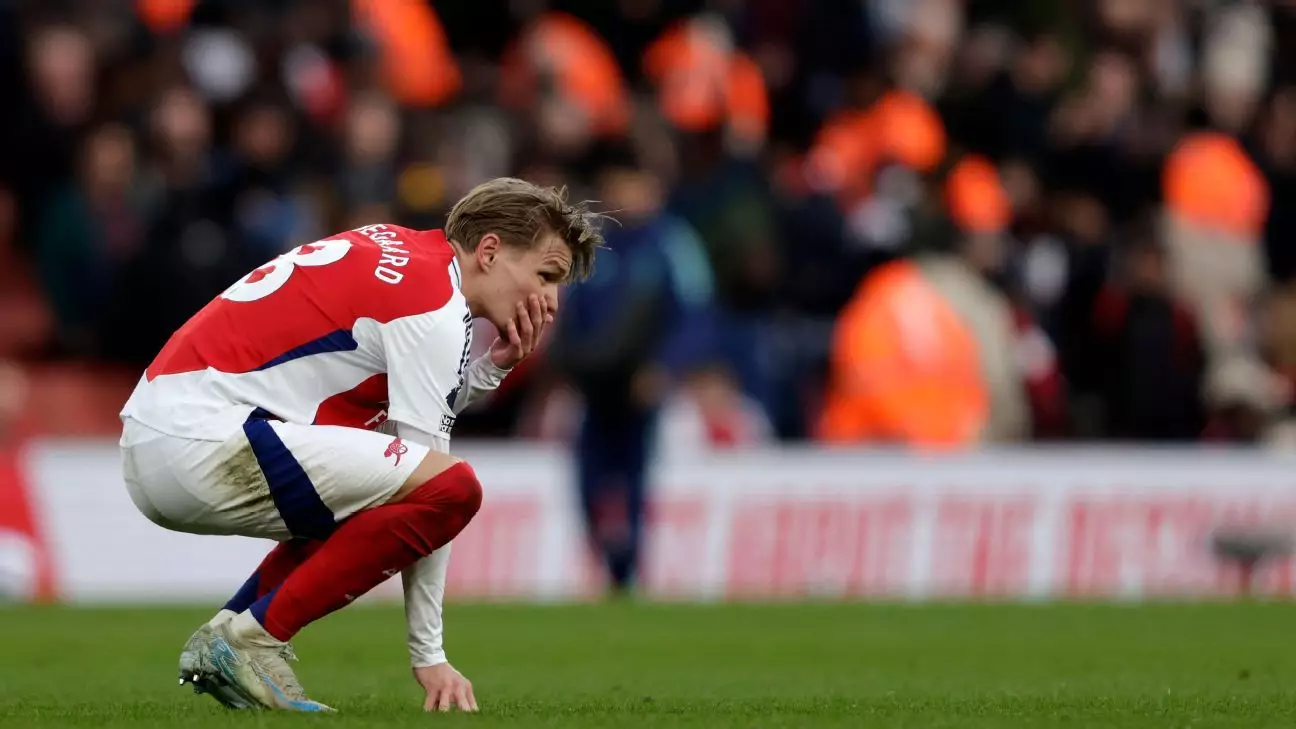Arsenal’s recent match against West Ham United exposed glaring tactical deficiencies and highlighted the risks associated with the decision-making structure at the club. The game ended unfavorably for the Gunners, losing 1-0 at the Emirates Stadium, a result that leaves more questions than answers regarding their title aspirations. Manager Mikel Arteta was evidently frustrated, stating that his team’s fate was no longer within their grasp. His side had the opportunity to capitalize on Liverpool’s missteps earlier in the week, but they faltered, leaving fans wondering if the situation could have been prevented with a strategic player acquisition.
While West Ham made a calculated decision to substitute match-winner Jarrod Bowen with the newly signed Evan Ferguson, a move that seemingly mocked Arsenal’s plight, Arteta’s failure to bolster his forward options in the transfer market raises eyebrows. The glaring lack of attacking choices was painfully evident in the match, an oversight that now looms large as Arsenal’s title chase evaporates into uncertainty.
Arteta’s reliance on Mikel Merino—a midfielder tasked with filling in for an absent striker—was a gamble that failed to pay off. Though he performed adequately in a previous match against Leicester City, expecting him to replicate such success against West Ham was, to put it mildly, a stretch. Unlike Kai Havertz, who has a proven track record and experience in higher stakes competitive environments, Merino lacks the pedigree needed for a team in desperate need of firepower. Arsenal’s failure to secure an established striker during the transfer window may prove to be one of the more regrettable decisions made in the current season.
The Gunners showed brief glimpses of attacking flair, as evidenced in the opening minutes, but quickly regressed into a stagnant performance, demonstrating a troubling lack of creativity. The continuity and dynamism that had characterized earlier displays were notably absent, leading to an overwhelming sense of frustration not just for Arteta, but for fans who expected more from a title contending side.
Analyzing Arsenal’s Tactical Flatness
The match against West Ham exposed structural issues within Arsenal’s tactical framework, particularly after the initial quarter-hour. Following an encouraging beginning, the Gunners struggled to maintain their ascendancy, failing to deploy meaningful pressure on the West Ham defense. With Liverpool’s slip-up on their minds, they were presented with a golden opportunity to close the gap at the summit of the Premier League table, yet their performance seemed devoid of the necessary urgency and hunger.
As the game progressed, fans witnessed a worrying familiarity. Arsenal’s sustained control of the ball was supplanted by a lack of incisiveness. Key players like Martin Ødegaard and Leandro Trossard were unable to affect the game in a meaningful way, leading to widespread discontent in the stands. The excitement fizzled out as the match progressed, with supporters expressing their frustration as the players resorted to lateral passes instead of challenging West Ham’s defenses directly.
The Red Card and its Consequences
The evening took a further downturn when Myles Lewis-Skelly’s foul on Mohammed Kudus resulted in a red card, forcing Arsenal to contend with adversity. Nonetheless, even with a numerical advantage, the Gunners could not capitalize. Their pedestrian style seemed ill-equipped to take advantage of the moment, further exacerbating concerns about their competitive edge. Arteta’s inability to implement a winning strategy amid adversity raised questions about his approach to high-stakes matches.
Despite the loss, it’s crucial to acknowledge that this was Arsenal’s first home defeat in nearly a year. One could argue that, under different circumstances—like the return of key players from injury—the Gunners may yet find a way back into contention. However, with crucial players like Havertz and Gabriel Jesus sidelined for the season, Arsenal’s quest for glory becomes increasingly difficult.
The fallout from this loss extends far beyond local bragging rights; it holds significant implications for Arsenal’s title aspirations. As their squad grapples with injury setbacks and a lack of effective reinforcements, the possibility of reclaiming a top spot appears increasingly unlikely. The decision not to make a more aggressive bid for prime targets like Ollie Watkins may very well haunt the club for years to come.
As Arsenal navigates the fallout from this disappointing outing against West Ham, a culture of accountability must prevail both amongst the players and the coaching staff. The club now stands at a crossroads; whether it progresses or falters will depend largely on the choices made in the forthcoming period. If the Gunners wish to retain their ambitions for silverware, decisive action and strategic foresight are paramount in the matches that lie ahead.

